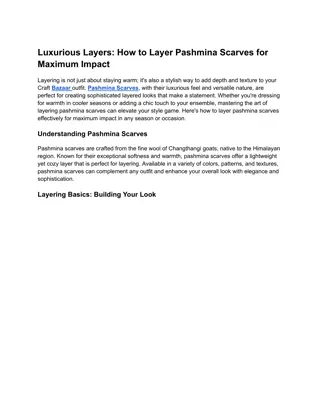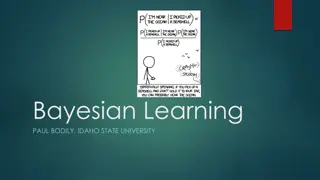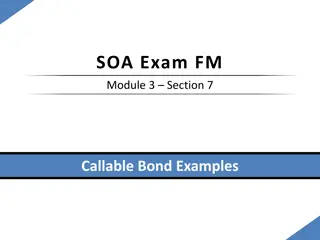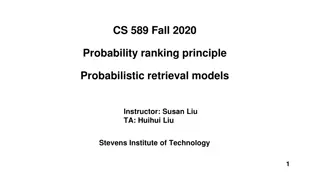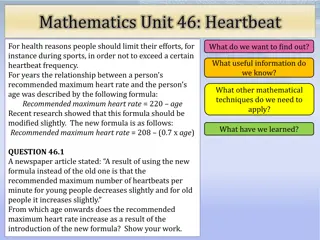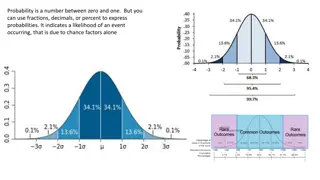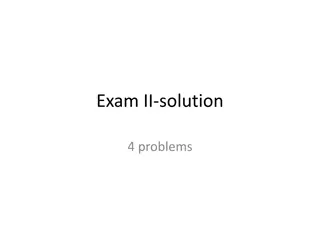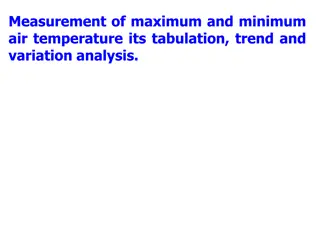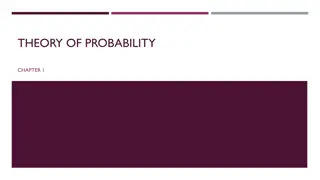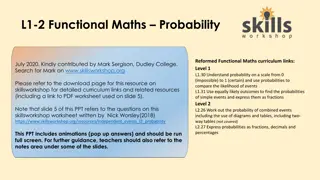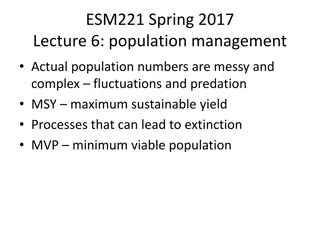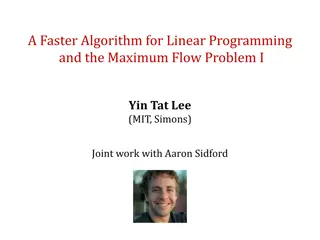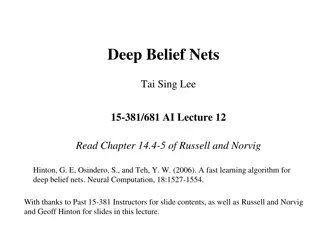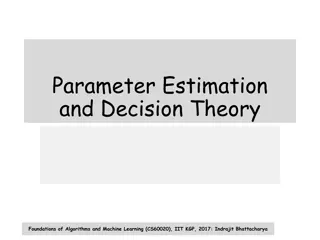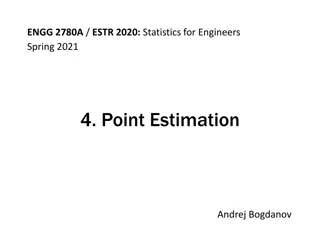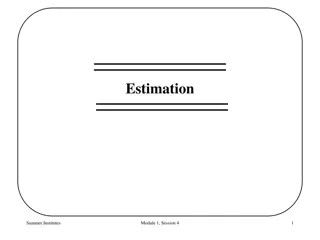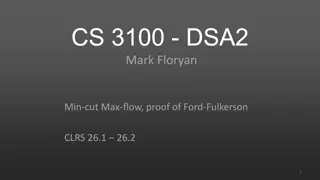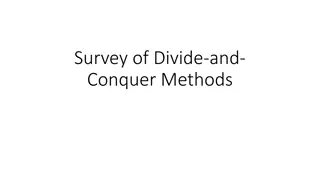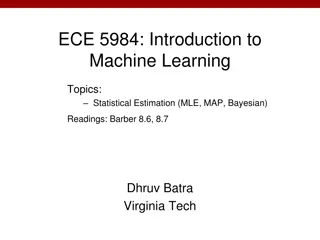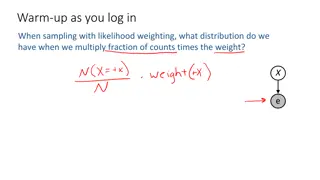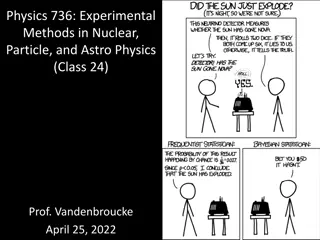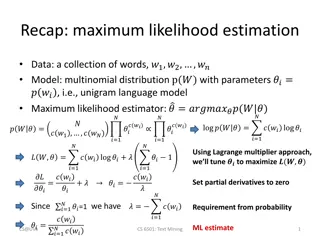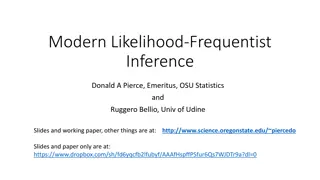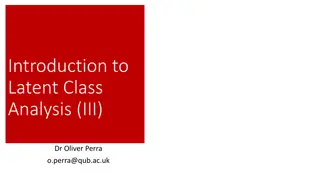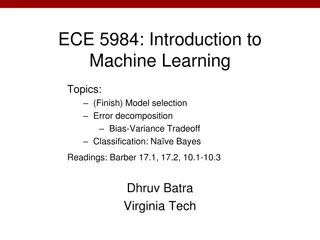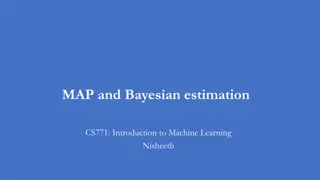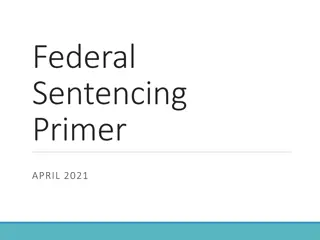Insights from Breathe Training Survey on Tobacco Education Usage
Survey responses from alternate partners involved in the Breathe 1-Month Survey from 2021-2023 provide valuable insights on the frequency of material use, perceived usefulness of materials for tobacco education, and future likelihood of material utilization. Key roles identified include Health Manag
3 views • 5 slides
If you are looking for Auto Air Conditioning Repairs in Barrington
If you are looking for Auto Air Conditioning Repairs in Barrington, Welcome to Maximum Auto Electrical & Aircon! As the leading auto electrician in Sydenham, we take pride in proudly serving the Christchurch area. At Maximum Auto, we are committed to ensuring your vehicles run perfectly day in and d
4 views • 6 slides
Luxurious Layers_ How to Layer Pashmina Scarves for Maximum Impact
Luxurious Layers_ How to Layer Pashmina Scarves for Maximum Impact
1 views • 5 slides
Bayesian Learning in Machine Learning
Bayesian learning is a powerful approach in machine learning that involves combining data likelihood with prior knowledge to make decisions. It includes Bayesian classification, where the posterior probability of an output class given input data is calculated using Bayes Rule. Understanding Bayesian
1 views • 17 slides
Maximum Price Calculation for Callable Bond with Annual Yield Requirement
A 20-year callable bond example is provided with a $1000 face value and 3% annual coupons, callable at different redemption values over specific years. The task is to determine the maximum price a buyer should pay to achieve a minimum annual yield of 5%. The calculation involves identifying the time
0 views • 33 slides
Binary Logistic Regression with SPSS – A Comprehensive Guide by Karl L. Wuensch
Explore the world of Binary Logistic Regression with SPSS through an instructional document provided by Karl L. Wuensch of East Carolina University. Understand when to use this regression model, its applications in research involving dichotomous variables, and the iterative maximum likelihood proced
0 views • 87 slides
Updated Vancomycin Collaborative Practice Guidelines in 2020
Vancomycin guidelines updated in 2020 include transitioning from trough-based to AUC-based monitoring, emphasizing achieving an AUC/MIC of 400-600 for improved outcomes. Major updates involve loading dose adjustments, targeting AUC/MIC instead of trough levels, and pharmacist-orderable MRSA nasal sw
0 views • 38 slides
Concrete Mix Design: Optimal Proportions & Aggregate Gradation
Concrete mix design is crucial for achieving the desired properties and performance of concrete. The Maximum Aggregate Density Mix Design method helps determine the best proportions for Portland Cement Concrete. Utilizing combined aggregate gradation near the maximum density line can reduce shrinkag
0 views • 34 slides
Probabilistic Retrieval Models and Ranking Principles
In CS 589 Fall 2020, topics covered include probabilistic retrieval models, probability ranking principles, and rescaling methods like IDF and pivoted length normalization. The lecture also delves into random variables, Bayes rules, and maximum likelihood estimation. Quiz questions explore document
0 views • 53 slides
Recommended Maximum Heart Rate Formula Adjustment Analysis
The recommended maximum heart rate formula has been updated from 220 - age to 208 * (0.7 * age). This alteration results in a slight decrease in maximum heart rate for young individuals and a slight increase for older individuals. We aim to determine the age at which the new formula causes an increa
0 views • 10 slides
Probability and Calculating Probabilities with Z-Scores
Probability is a number between zero and one that indicates the likelihood of an event occurring due to chance factors alone. This content covers the concept of probability, the calculation of probabilities using z-scores, and practical examples related to probability in statistics. You will learn a
0 views • 12 slides
Maximum Likelihood Estimation
Dive into the concept of Maximum Likelihood Estimation, where we estimate parameters based on observed outcomes in experiments. Learn how to calculate likelihoods and choose the most probable set of rules to maximize event occurrences.
5 views • 24 slides
Modadove.com top-quality modafinil pills for sale can unlock your maximum
Modadove.com top-quality modafinil pills for sale can unlock your maximum potential. Improve your productivity and concentration today. Place your order immediately!
10 views • 1 slides
Structural Engineering Solutions: Moments, Stresses, and Centroids
An in-depth analysis of structural engineering problems involving centroids, moments of inertia, maximum stresses, and curvature calculations. Solutions are provided for scenarios such as the application of couples to machine parts and wooden beams, determining maximum tensile and compressive stress
0 views • 12 slides
Temperature Measurement in Plant Growth
Exploring the measurement of maximum and minimum air temperature, its significance in analyzing trends and variations, and how temperature impacts plant growth stages. The optimal temperature ranges for different plant species and the importance of maximum and minimum temperature recordings using sp
0 views • 20 slides
Enhancing TCP Performance: Understanding Maximum Window Size
Explore the concept of increasing the maximum window size of TCP to improve performance. Delve into discussions on the current limitations, proposals for enhancement, and the importance of understanding TCP sequencing. Discover insights on why the maximum window size must be less than 2^30 and wheth
1 views • 8 slides
Probability Theory: Basics and Applications
Probability theory is a branch of mathematics that deals with the likelihood of different outcomes in random phenomena. It involves concepts such as sample space, probability distributions, and random variables to determine the chance of events occurring. The theory utilizes theoretical and experime
0 views • 11 slides
Probability in Functional Maths Curriculum
Explore probability concepts in functional maths, such as understanding probability scales, comparing likelihood of events, calculating probabilities of simple and combined events, and expressing probabilities as fractions, decimals, and percentages. Practice drawing probability lines, simplifying f
1 views • 8 slides
Solving Maximum Contiguous Subarray Sum Problem with Dynamic Programming
Explore the concept of finding the maximum contiguous subarray sum using dynamic programming as an improvement over divide and conquer algorithms. Learn the steps of defining the objective, writing recurrences, designing memoization structures, and implementing iterative algorithms. Delve into the d
3 views • 32 slides
Investigating Factors Affecting Maximum Tower Height
This project delves into determining the factors that limit the maximum height of a tower built by stacking rectangular bricks. The experiment explores the impact of human skill, brick shape, stability of the hand, age, and building system on tower height. Through theoretical background, hypothesis
0 views • 23 slides
Population Management and Sustainable Harvesting Strategies
Actual population numbers exhibit complex fluctuations influenced by predation and other factors. Understanding concepts like Maximum Sustainable Yield (MSY) and Minimum Viable Population (MVP) can help in managing populations effectively. The concept of MSY ensures the maximum harvest of a renewabl
0 views • 32 slides
A Faster Algorithm for Linear Programming and the Maximum Flow Problem
A comprehensive overview of a new algorithm for linear programming and the maximum flow problem developed by Yin Tat Lee and Aaron Sidford from MIT and Simons. The algorithm aims to improve efficiency by reducing the number of iterations required to reach the optimal solution. It discusses the histo
0 views • 40 slides
Introduction to Deep Belief Nets and Probabilistic Inference Methods
Explore the concepts of deep belief nets and probabilistic inference methods through lecture slides covering topics such as rejection sampling, likelihood weighting, posterior probability estimation, and the influence of evidence variables on sampling distributions. Understand how evidence affects t
0 views • 47 slides
Foundations of Parameter Estimation and Decision Theory in Machine Learning
Explore the foundations of parameter estimation and decision theory in machine learning through topics such as frequentist estimation, properties of estimators, Bayesian parameter estimation, and maximum likelihood estimator. Understand concepts like consistency, bias-variance trade-off, and the Bay
0 views • 15 slides
Point Estimation and Maximum Likelihood in Statistics
This collection of images and text delves into various topics in statistics essential for engineers, such as point estimation, unbiased estimators, maximum likelihood, and estimating parameters from different probability distributions. Concepts like estimating from Uniform samples, choosing between
0 views • 16 slides
Maximum Likelihood Estimation
Estimation methods play a crucial role in statistical modeling. Maximum Likelihood Estimation (MLE) is a powerful technique invented by Fisher in 1922 for estimating unknown model parameters. This session explores how MLE works, its applications in different scenarios like genetic analysis, and prac
0 views • 27 slides
Ford-Fulkerson Algorithm for Maximum Flow in Networks
The Ford-Fulkerson algorithm is used to find the maximum flow in a network by iteratively pushing flow along paths and updating residual capacities until no more augmenting paths are found. This algorithm is crucial for solving flow network problems, such as finding min-cuts and max-flow. By modelin
1 views • 26 slides
Divide and Conquer Algorithms - Dr. Maram Bani Younes
This chapter on divide and conquer algorithms introduces key concepts such as dividing the problem into smaller subproblems, solving them, and combining the solutions. It covers techniques like finding maximum and minimum elements, maximum contiguous subsequence sum, binary search, quick sort, merge
1 views • 30 slides
Enhancing Phylogenetic Analysis Using Divide-and-Conquer Methods
Large-scale phylogenetics presents challenges due to NP-hardness and dataset sizes. Divide-and-conquer methods like SATe, PASTA, and MAGUS enable efficient processing of large datasets by dividing, aligning, and merging subsets with accuracy. MAGUS, a variant of PASTA, utilizes a unique alignment me
0 views • 15 slides
Introduction to Statistical Estimation in Machine Learning
Explore the fundamental concepts of statistical estimation in machine learning, including Maximum Likelihood Estimation (MLE), Maximum A Posteriori (MAP), and Bayesian estimation. Learn about key topics such as probabilities, interpreting probabilities from different perspectives, marginal distribut
0 views • 23 slides
Likelihood Weighting in Sampling
When using likelihood weighting for sampling, multiplying the fraction of counts by the weight results in a specific distribution. Likelihood weighting may fail in scenarios with high complexities, prompting the need for alternative algorithms like resampling. This technique involves eliminating unf
0 views • 27 slides
Maximum Likelihood Estimation in Physics
Maximum likelihood estimation (MLE) is a powerful statistical method used in nuclear, particle, and astro physics to derive estimators for parameters by maximizing the likelihood function. MLE is versatile and can be used in various problems, although it can be computationally intensive. MLE estimat
0 views • 22 slides
Maximum Likelihood Estimation in Statistics
In the field of statistics, Maximum Likelihood Estimation (MLE) is a crucial method for estimating the parameters of a statistical model. The process involves finding the values of parameters that maximize the likelihood function based on observed data. This summary covers the concept of MLE, how to
0 views • 19 slides
Indian Housing Block Grant 2023 Competitive Priorities
The Fiscal Year 2023 Indian Housing Block Grant (IHBG) Competitive NOFO Training focuses on Soundness of Approach with a maximum of 42 points. Subfactor 3.1 emphasizes IHBG Competitive Priorities, including new housing construction projects, housing rehabilitation projects, acquisition of units, and
0 views • 23 slides
Statistical Text Analysis Techniques Overview
The content covers key concepts in statistical text analysis, including maximum likelihood estimation, N-gram language model smoothing, and perplexity calculation. It then delves into Latent Semantic Analysis and the practical application of vector space models, highlighting considerations like syno
0 views • 28 slides
Modern Likelihood-Frequentist Inference: A Brief Overview
The presentation by Donald A. Pierce and Ruggero Bellio delves into Modern Likelihood-Frequentist Inference, discussing its significance as an advancement in statistical theory and methods. They highlight the shift towards likelihood and sufficiency, complementing Neyman-Pearson theory. The talk cov
0 views • 22 slides
Latent Class Analysis: Estimation and Model Optimization
Latent Class Analysis (LCA) is a person-centered approach where individuals are assigned to different categories based on observed behaviors related to underlying categorical differences. The estimation problem in LCA involves estimating unobservable parameters using maximum likelihood approaches li
0 views • 30 slides
Introduction to Machine Learning: Model Selection and Error Decomposition
This course covers topics such as model selection, error decomposition, bias-variance tradeoff, and classification using Naive Bayes. Students are required to implement linear regression, Naive Bayes, and logistic regression for homework. Important administrative information about deadlines, mid-ter
0 views • 42 slides
Maximum Likelihood Estimation in Machine Learning
In the realm of machine learning, Maximum Likelihood Estimation (MLE) plays a crucial role in estimating parameters by maximizing the likelihood of observed data. This process involves optimizing log-likelihood functions for better numerical stability and efficiency. MLE aims to find parameters that
0 views • 18 slides
Federal Sentencing Principles
Federal sentencing is determined by various factors including the applicable sentencing statute, statutory maximum and minimum terms of imprisonment, fines, supervised release terms, special assessments, the U.S. Sentencing Commission Guidelines Manual, judicial discretion, and factors outlined in 1
0 views • 26 slides


